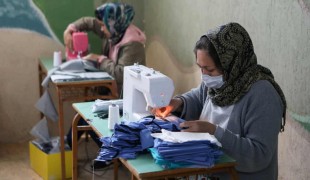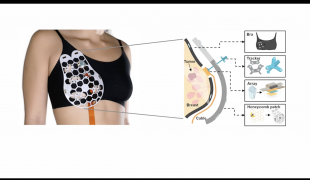- 12265
- 528
- 39
- 27
- 0
- Help Ukraine
About the solution
In 1998, Arunachalam had just married his wife Shanthi. One day he noticed she was hiding something from him - rags, “nasty cloths”, she used as sanitary pads.
"I will be honest. I would not even use it to clean my scooter", the man confessed. When he asked his wife why she didn’t use sanitary pads, she said that if she were to buy them, she wouldn’t be able to afford to buy food.
Arunachalam bought his wife a sanitary pad but it was indeed too expensive. So he decided to make sanitary pads himself. He gave it to his wife and asked for feedback. He found out that in his village, women used not only nasty cloths but also unhygienic substances such as sand, sawdust, leaves and even ash. Approximately 70% of all reproductive diseases in India are caused by poor menstrual hygiene - it can also affect maternal mortality. This got him even more motivated.
It was hard for him to find reliable women to test his products. So he created a “uterus! from a football bladder, by punching holes on it, and filling it with goat’s blood. Then he would use his sanitary pad himself. Arunachalam would collect the blood and mix in an additive he got from another friend at a blood bank to prevent it clotting too quickly - but it didn't stop the smell.
After more than four years of research, he came up with a low-cost method for the production of sanitary pads. The process involves four simple steps. First, a machine similar to a kitchen grinder breaks down the hard cellulose into fluffy material, which is packed into rectangular cakes with another machine.
The cakes are then wrapped in non-woven cloth and disinfected in an ultraviolet treatment unit. The whole process can be learned in an hour.
Arunachalam’s goal was to create user-friendly technology. His mission was not only to increase and promote the use of sanitary pads but also to create jobs for rural women.
The machines are kept deliberately simple and skeletal so that they can be maintained by the women themselves. The first model was mostly made of wood. Then he got an award for his invention.
"Imagine, I got patent rights to the only machine in the world to make low-cost sanitary napkins - a hot-cake product. From childhood, I know no human being died because of poverty - everything happens because of ignorance".
He believes that big business is parasitic, like a mosquito, whereas he prefers the lighter touch, like that of a butterfly. "A butterfly can suck honey from the flower without damaging it," he says. So he became an entrepreneur and leads his company, Jayaashree Industries. Most of his clients are NGOs and women self-help groups.
He also invented the vending machine that can dispense single pads with the insertion of a coin.
Adapted from: https://bbc.in/2RB7kBH
https://bit.ly/31TevdZ
https://bit.ly/2LdvDW7
More info: https://newinventions.in/
https://www.youtube.com/watch?v=L2u7t9
这些解决方案不应包括使用药物,化学品或生物制品(包括食品);创伤性设备;冒犯性的,商业或内在危险的内容。该解决方案未经医学验证。请谨慎进行!如果您有任何疑问,请咨询健康专家。
DISCLAIMER: This story was written by someone who is not the author of the solution, therefore please be advised that, although it was written with the utmost respect for the innovation and the innovator, there can be some incorrect statements. If you find any errors please contact the patient Innovation team via info@patient-innovation.com
-
-
384
-
0
-
4384

Students develop a project to help African women with hygiene
(SELF)-CARE: HYGIENE: Maintaining personal hygiene
Menstruation and Uterine Bleeding
Educational/Leisure device (book, toy, game...)
Body-Worn solutions (Clothing, accessories, shoes, sensors...)
Menstrual irregularities
Anxiety
Muscle cramps or spasms
Enhancing health literacy
Promoting self-management
Preventing (Vaccination, Protection, Falls, Research/Mapping)
Raise awareness
Gynecology and Obstetrics
Public Health
Kenya
-
-
-
383
-
0
-
4929

Refugees start awareness team and sewing team to cope with the outbreak of COVID 19 within the refugee camp
(SELF)-CARE: HYGIENE: Maintaining personal hygiene
Social interaction
Covid19
Body-Worn solutions (Clothing, accessories, shoes, sensors...)
Strategy/Tip
Sore throat
Fever
Fatigue
Difficulty breathing deeply
Nasal congestion
Dry cough
Sinus pain or pressure.
Shortness of breath
Promoting self-management
Preventing (Vaccination, Protection, Falls, Research/Mapping)
Raise awareness
Caregiving Support
General and Family Medicine
Infectious Diseases
Intensive Care Medicine
Pneumology
Public Health
Greece
-
-
-
332
-
0
-
3778

Canan Dagdeviren creates a wearable ultrasound scanner could detect breast cancer earlier.
CAREGIVING
Breast Cancer
AI algorithm
3d Printed
Body-Worn solutions (Clothing, accessories, shoes, sensors...)
Promoting self-management
To implement a diagnostic tool
To improve Treatment/Therapy
Preventing (Vaccination, Protection, Falls, Research/Mapping)
Raise awareness
General and Family Medicine
Gynecology and Obstetrics
Medical Oncology
United States
-
 zh
zh